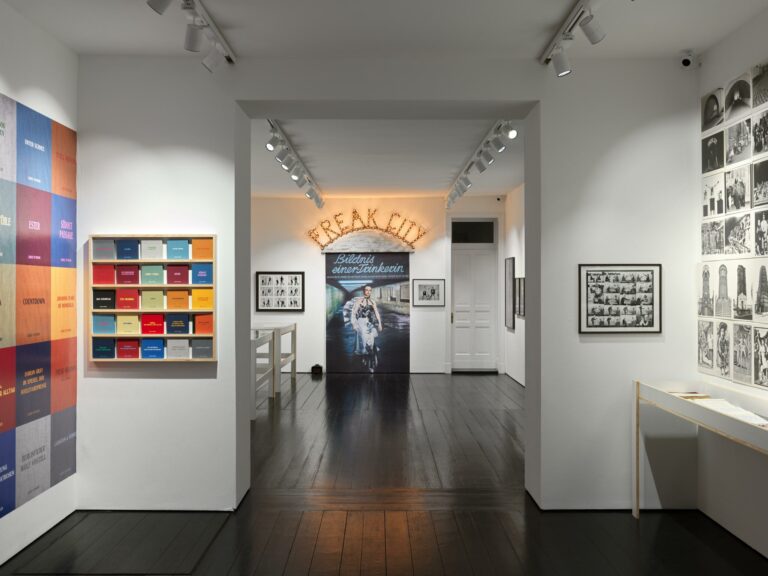Published 12 NOV 2024
Ulrike Ottinger
25 Filme – Screening The Archive
2 NOV until 21 DEC 2024
12 NOV 2024, 7 pm
CAMP TALKS: AESTHETICS AND ITS GENESIS
The title of Ulrike Ottinger’s latest exhibition at CFA suggests both: 25 Films – Screening the Archive highlights Ottinger’s cinematic and artistic practice spanning five decades with a limited edition, photographic works, a picture atlas, original scripts and props.

Installation view
Ulrike Ottinger, 25 Films – Screening the Archive
Courtesy Contemporary Fine Arts Berlin
Photo: Nick Ash
Born in 1942, Ottinger has been one of the most important German filmmakers since the 1970s and is a pioneering trailblazer of “queer cinema”. Her films not only transcend the boundaries between fiction, documentary and cinematic essay, they are also part of a complex “Gesamtkunstwerk” characterised by historical, anthropological and ethnological interests. It works equally with language, music, painting, installation, costume, architecture and performance, all of which relate to each other in ever new constellations.
The starting point for 25 Films – Screening the Archive is 25 strictly limited film boxes designed by Ottinger, hand-stamped linen cassettes with DVD/Blue Ray and booklet. The exhibition focuses on Ottinger’s Berlin Trilogy, which brought her international acclaim: Ticket of No Return (1979), Freak Orlando (1981) and Dorian Gray in the Mirror of the Yellow Press (1984).
The films create a topology of the former frontline city of West Berlin. At the same time, they are a homage to sexual misfits, freaks, time travelers, hedonistic dandies and trans people. The protagonists act as tour guides. Ticket of No Return, for example, follows Tabea Blumenschein as a mysterious, elegant alcoholic on a self-destructive, glamorous tour of the dive bars of SO36, which at the time was still in ruins and populated by squatters. As the hermaphrodite Orlando, Magdalena Montezuma undertakes a journey through time from mythological prehistory to the 20th century – which also takes her through the industrial landscapes of Berlin and into the fascist past. Veruschka’s late-capitalist Dorian Gray follows the shadowy Dr. Mabuse (Delphine Seyring) into an underworld of sewers and subway shafts.
25 Films – Screening the Archive shows not only the original scripts, which are also visual montages, but also photo series such as Der Schrei (1977), which resulted from sessions with Ottinger and Blumenschein, or Ciao, a series realised in the 1970s with Valeska Gert. For Freak Orlando, Ottinger compiled the atlas Freak Orlando – Bilderpartitur (1979-1981), consisting of 114 individual photographs for the film. The photo series Verzerrungen (1981) with Magdalena Montezuma explores a leitmotif in Ottinger’s early films: the female, non-binary, chaotic, transgressive body that must be disciplined, corrected, purified, destroyed by authoritarian systems so as not to endanger the “healthy” majority. In the face of the current shift to the right, the return of fascism, Ottinger’s work takes on a new urgency.
